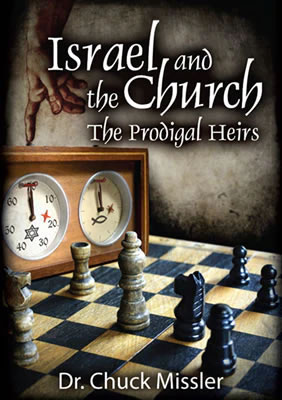For thus saith the LORD of hosts; After the glory hath he sent me unto the nations which spoiled you: for he that toucheth you toucheth the apple of his eye.
— Zechariah 2:8
But thou, Israel, art my servant, Jacob whom I have chosen, the seed of Abraham my friend. Thou whom I have taken from the ends of the earth, and called thee from the chief men thereof, and said unto thee, Thou art my servant; I have chosen thee, and not cast thee away.
— Isaiah 41:8–9
In any pastor’s study we will find a set of books called Systematic Theology, and in those books we will find doctrinal views on a large number of subjects. Although their focus will differ depending on their denominational emphasis, the table of contents of these books is almost exactly the same. Yet, they are almost all missing one very important subject.
Which one?
Most sets have a section on Bibliology (the study of the Bible), Theology (the attributes of God), Pneumatology (the study of the Holy Spirit), Angelology (studies of angels, both holy and fallen), Anthropology (the study of man in Scripture); Soteriology (the study of salvation), Ecclesiology (the study of the Church) and Eschatology (the study of end times). All of these subjects are important things for a pastor to understand.
Yet, the piece that is missing from almost every one involves nearly five-sixths of the entire Bible. Books on Systematic Theology consistently leave out the subject of Israel. They fail to cover what we’d call “Israelology.”
This is a travesty! Israel was given the central role of bringing knowledge of the true God to the world. Through Israel came the Messiah, the Savior of humankind. Israel is called the apple of God’s eye, yet Christian theologians have systematically overlooked Israel’s purpose and destiny as a major category of study. I’m not facetious at all. Israel as an instrument in God’s plan of redemption is not only a valid topic, it’s at the center of God’s plan. Yet, we won’t find it taught in most seminaries.
I like to call Israel “The Prodigal Heirs.” We are not here to sweep anything under the carpet. We want to look candidly at both Israel and the Church, and the way we do that is to look at both of their histories in Scripture. We find that both have different origins, missions, and destinies.
In his letters, Paul gives us a trichotomy; he divides people into three categories. Of course, the early Church understood the difference between the Jews and the Gentiles. Those were the only two categories that Jews knew in the Old Testament, and they’ll apply again after the Rapture. Right now, however, there are three categories that Paul hammers at: Jews, Gentiles, and the Church. These are distinct and separate groups.
In this book, we are first going to overview the history of Israel from the Scriptures. We are also going to look at the Church and its unique history and set of purposes. Many Christians believe the role of Israel has been taken over by the Church. After all, the Jews as a group rejected Jesus Christ, and the Church was given the great commission to take the Gospel to the world. The Jews have turned their backs on their own Messiah, but the Church has embraced Him. This may be generally true, but we find that the Bible offers continued hope for the Jews, the people of Israel. As we move forward, we will find that Israel and the Church are two separate groups with unique privileges and benefits, purposes and destinies.
Paul gives us a key passage that hammers home the Bible’s position on Israel:
For I would not, brethren, that ye should be ignorant of this mystery, lest ye should be wise in your own conceits; that blindness in part is happened to Israel, until the fulness of the Gentiles be come in. And so all Israel shall be saved: as it is written, There shall come out of Sion the Deliverer, and shall turn away ungodliness from Jacob: For this is my covenant unto them, when I shall take away their sins. As concerning the gospel, they are enemies for your sakes: but as touching the election, they are beloved for the fathers’ sakes. For the gifts and calling of God are without repentance.
— Romans 11:25–29
This is not just Paul’s summary of the issue, but it summarizes the Bible’s prophecies as a whole.
Second Chances
One of my favorite passages can be found in Acts 7, where Stephen gives us a very convenient summary of the history of Israel. Here we find Stephen, a young deacon standing before the Sanhedrin itself — Israel’s most august body.
I was delighted to discover that Acts 7 is also a favorite of my friend Hal Lindsey. When I was teaching at Calvary Chapel many years ago, Hal would come to our Monday night study with his notebook in hand, ready to take notes. He specifically didn’t want to miss the study on Acts 7, because Stephen goes through the history of Israel from a very interesting point of view. Stephen summarizes the history of Israel, but he does so by showing how the Israelites were unresponsive to God’s requests throughout their history, yet God persisted in His purposes and in seeking their benefit anyway.
I recommend that everyone go through Acts 7 with a pen and paper and build an outline of Stephen’s talk. Those who do will make an important discovery; Stephen follows a pattern. Whether he is talking about Abraham, Moses, or Joseph, Stephen consistently follows a pattern in which each of these Biblical heroes first blows it, but then makes it the end. He leads up to the fact that Israel has messed up by not recognizing their Messiah, and we can anticipate what he was about to point out: they would get it right in the end. Unfortunately, the Jewish leaders interrupt and don’t let Stephen finish, so we don’t get to hear his conclusion. As soon as Stephen begins criticizing them for their hard hearts, they pick up stones and murder him. However, if we understand his outline, we can see the same pattern; they would mess up at first, but the second time they would make it. That’s really what he is saying.
Of course, Stephen starts with Abraham, arguably the first Jew as the father of the children of Israel.
God called Abraham in Genesis 12, where the text tells us that Abraham was 75 years old when he left Haran. Stephen, filled with the Holy Spirit, adds to the story information we can’t find in Genesis. He tells the members of the Sanhedrin (who don’t protest) that God spoke to Abraham while he still lived in Ur, telling him to move to Canaan. The family does start to move west but settles in Haran for a time. Apparently Abraham takes his time and only leaves Haran when his father dies. We don’t know this from Genesis. We only know it from Acts, because Stephen tells us that Abraham left Haran after his father died.
Unfortunately, this is confusing if we look at the King James Bible, which is based on the Masoretic Text. The MT tells us in Genesis 11:32 that Terah was 205 when he died, which means that Abraham would have had to be 135 when he left Haran if he waited until his father died. That doesn’t add up. The Samaritan Pentateuch comes to our rescue with a variation that says Terah died when he was 145. In the Hebrew, it is easy to see how a copyist error could have been made, and this is one of those cases in which the Samaritan Pentateuch has the correct reading. Abraham settled in Haran, and then at the age of 75, when his father died, he continued westward to the land of Canaan.
In other words, Abraham only reached Haran the first time God called. He finally left his father’s house behind and continued on to Canaan after his father died. Whether God called him a second time or whether he finally finished his journey years later, it took quite a while for Abraham to finally obey God and travel all the way to Canaan proper. Those sins are hidden, but we can find them if we study carefully.
Joseph is another example. He was hated by his brothers when he was young. He recognized them the first time they came into Egypt, but they didn’t recognize him. It wasn’t until he revealed himself to them on their second trip that they recognized him and repented for their treatment of him.
Moses was rejected by his brethren the Israelites after he killed the Egyptian, and Stephen picks up on that fact. Moses spent 40 years in Midian before he was accepted — when he came to his people’s aid the second time.
Stephen goes on with this pattern, but then he says to the Sanhedrin:
Ye stiffnecked and uncircumcised in heart and ears, ye do always resist the Holy Ghost: as your fathers did, so do ye. Which of the prophets have not your fathers persecuted? and they have slain them which shewed before of the coming of the Just One; of whom ye have been now the betrayers and murderers: Who have received the law by the disposition of angels, and have not kept it.
— Acts 7:51–53
Stephen’s tact and gentleness are interrupted by an angry mob that takes up stones to kill him. This is a young man in front of the greatly respected Sanhedrin. I want to highlight that their national trait is deadly hostility to the messengers of God. His presentation was interrupted by his martyrdom, and that why it’s interesting to outline and predict where he was headed with this presentation. They didn’t let him finish, but Stephen’s implied climax is that they would accept their Messiah the second time.
The Vineyard Workers
The Messiah assesses the situation in a summary found both in Mark 12 and Luke 20. Israel is portrayed as a vineyard in Isaiah 5, and the idiom is a familiar one in the Jewish mind. Jesus describes a vineyard owner who rents out his vineyard, but the husbandmen are not diligent, and they refuse to make their payment of vineyard fruit to the owner. In Jesus’ parable, the husbandmen are the keepers of the vineyard — the leaders of Israel. Over and over the owner sends servants to collect the fruit, and the husbandmen either beat up or kill each one. Finally, the owner decides that he will send his own son. Rather than respecting the son, though, the husbandmen kill him too, hoping to take his inheritance and keep the vineyard for themselves.
Jesus poses the question: How will the landowner deal with these wicked tenants? He will destroy them and replace them.
Then Jesus quotes Psalm 118:22:
And he beheld them, and said, What is this then that is written, The stone which the builders rejected, the same is become the head of the corner? Whosoever shall fall upon that stone shall be broken; but on whomsoever it shall fall, it will grind him to powder.
— Luke 20:17–18
Jesus is quoting Psalm 118, and we find that the word “stone” or “rock” from Genesis through Revelation is used consistently to speak of Christ. The imagery is strange — Christ is the stone that is initially rejected, but eventually takes the most important, prominent position as the head of the corner. If we fall on Christ, we are broken, but if He falls on us, we are ground to dust. This is a strange picture, but it’s consistent throughout the Book.
I’m convinced that every number and place name — every detail — in the Biblical text is there by deliberate design. The work of the Holy Spirit is evident in the entire work. While the Bible was written by 40 different men during a span of 2000 years in 66 different books, the design is clear, and it’s breathtaking. It’s one entire story from Genesis to Revelation, and once you discover this for yourself, it changes your whole perspective about the Word of God.
Israel has rejected her own King. The very Messiah their prophets foretold has been embraced by Gentiles, while the Jews have cast Him aside. The pattern throughout Scripture, though, is that God’s people who mess up the first time succeed in the end. Christ was rejected the first time, but He will be honored in the end.
In a painful moment found in Matthew 23, Jesus describes the tragedy of all history in just one sentence:
O Jerusalem, Jerusalem, thou that killest the prophets, and stonest them which are sent unto thee, how often would I have gathered thy children together, even as a hen gathereth her chickens under her wings, and ye would not!
— Matthew 23:37
Even in this translation his anxiety, grief, and concern are tangible. “O Jerusalem!” The tragedy of all history is the final phrase, “And ye would not.”
Forever? No, fortunately. Paul in Romans 11:25 says, “…that blindness in part is happened to Israel, until the fulness of the Gentiles be come in.” We, the Gentiles, make up the Church. When the Church is complete, that blindness is going to be lifted.
This excerpt is from Dr. Chuck Missler’s book Israel and the Church, now available in print and eBook from the K-House store. Also available in Kindle format from Amazon.







